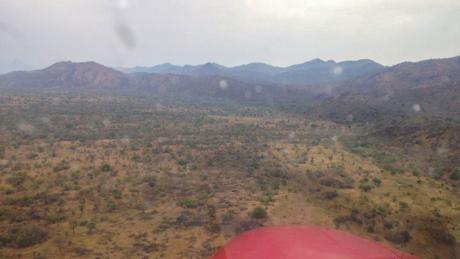
Pilot Raphael Flach overflew a newly reopened airstrip in Arilo at the start of an exciting week for the Gospel in South Sudan. A day later, he landed with a brand-new translation of the Bible in the language of the Tennet people. A few days after that he brought a plane full of translators from SIL to celebrate as the new scripture translation was dedicated and distributed in the community.
The airstrip in a remote part of in Eastern Equatoria State hadn’t been serviceable since 2013 when Raphael made the first landing with 170kgs of Bibles – the first delivery of the New Testament translation in the Tennet language to be received in the community.
‘As I overflew the airstrip on Monday to do an aerial assessment, I could see that they had worked really hard to prepare the strip. They cleared out the area that used to be a field. There are no cars in the community, and they would have done all of this work by hand.
Arilo and the surrounding area is home to the Tennet People, a Nilotic people group with an estimated population of 10-15,000 who are classified as minimally reached with the Gospel, according to the Joshua Project. According to SIL, the translation process began in 1993 in Kenya and has continued across three locations including Kenya, Uganda and Khatoum.
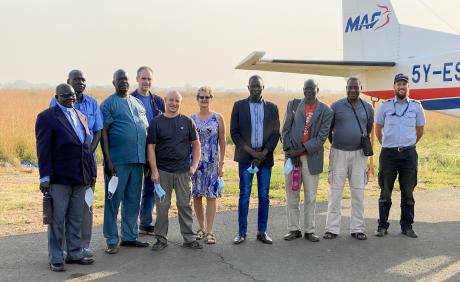
Celebrating and training
SIL Translator Osfaldo Cirino was part of the team travelling to attend the celebrations. ‘We are flying today for the dedication of the scriptures. We expect many people at the celebration from the town there to attend. Also some neighbours who will come to celebrate with us,’ he says.
SIL Language Programme Manager Paul Otto shared more about the celebrations. ‘The celebration to dedicate the New Testament will take place on Sunday. The translation was actually printed in 2020, but because of Covid-19 – we were not able to deliver a dedicate it then. We are doing it now, so the church can begin using it.’
‘As well as the dedication, we will do some training called “faith comes by hearing,” with the church leaders, to teach them how to use the scriptures to reach people who can’t read. People who don’t know how to read and write can listen to the scriptures instead,’ Paul explains.
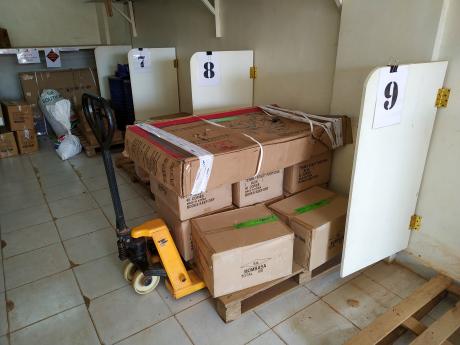
In the beginning
Passenger Scott Randal, travelled from the States to join the celebration. He was involved with the translation from the beginning. ‘The translation started, because there were two pastors studying at Bible college in Kijabe in Kenya who asked SIL for help when they realised that they needed Scripture in their own language. SIL sent me to work alongside them. We started with language research, recording folktales and by investigating the best reading system to use for the language. We then did some initial scripture portions. I left after seven years, and they continued the project while I was gone.’
Fellow translator Adelino Amargira, who picked up the translation project after Scott left, explains how things developed from there. ‘After the language analysis, we continue with the Bible translation. The first book we translated was the Gospel of Luke which contains the stories about the life of Jesus. We finished all the Gospels first before moving onto the Acts of the Apostles and the Letters of Paul.
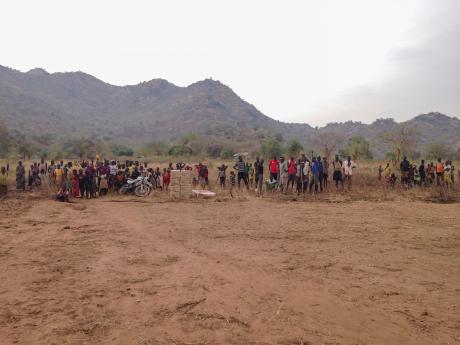
Challenges
'Translation efforts were disrupted by war,' Adelino continues to explain. 'We did it in Uganda, because by then there was no peace. We moved back and forth from Uganda to South Sudan.'
The translation team faced struggled with a lack of manpower, at one point as Adelino explains. ‘I became the only translator, as the other translators abandoned the translation, and I was left to continue the translation alone. I was able to send a call to the community for some people to join me. With their help, we have managed to finish the New Testament, Genesis, Exodus chapters 1-20 and the Book of Ruth. We still have a long way to go. We will continue,’ he says determinedly.
After years of hard work, and additional delays due to Covid, ‘I was very excited when I first saw the translation in print,’ Adelino says. ‘It’s a happy day to know that people are finally able to read the Bible!
‘One day, as we were giving out the Bible portion, there was a lady, who said, “What is this?” When I told her that it is the Word of God in Tennet, she said, “Now the Tennet have become human beings.” That really touched me a lot! '
Seen by God
He shares a story to illustrate what the new translation means to the community. ‘One day, as we were giving out the Bible portion, there was a lady, who said, “What is this?” When I told her that it is the Word of God in Tennet, she said, “Now the Tennet have become human beings.” That really touched me a lot! Before, without the word of God they felt that they were somehow less than other people. It encouraged some of us, to know how much people valued the Bible. To see the realisation of what we were doing. Translation is a very long, tiring and tedious process – but it is always worth the effort.
‘We used to travel to Arilo with MAF, after 2013 we went by road but later there was some trouble along the way. There are some occasions when we could not reach the village but went to Kenya and Torit where there are Tennet people and spoke to those people there instead. We wanted to reach different parts of the community and no just focus in one place,’ Adelino explains.
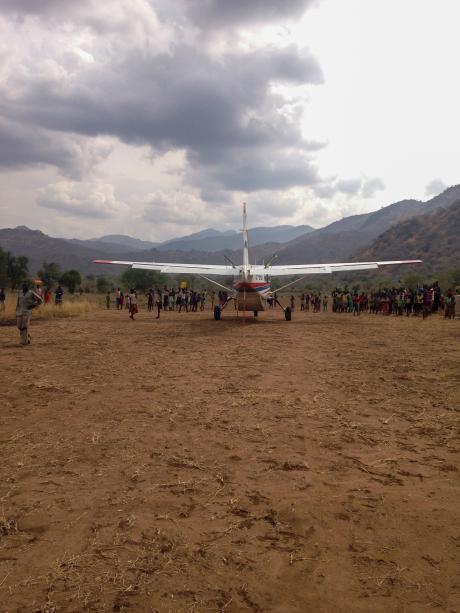
Bringing Good News
‘Landing there on Tuesday, was pretty exciting. It’s not an ideal airstrip,’ laughs experienced pilot Raphael. ‘There are soft spots which pull you to left and right so you have to really be on the brakes but also ready to add a bit of power so you don’t sink in too much. It’s kind of tricky. You have to be on your toes, ready to respond. There is a lot going on with the power, brakes and steering, which is fun!’
The challenges of landing at the airstrip are nothing compared to the challenges of travelling by road in this part of South Sudan as Raphael explains. ‘It is reasonably dry today, but in the wet season, roads in this part of Eastern Equatoria, are completely unpassable. They are some of the worst roads in the country, making these communities some of the most isolated in South Sudan. There is no mobile phone coverage unless you climb one of the mountains, which adds to isolation not to mention the challenge of communicating with passengers once they’re in Arilo!’ Raphael point out.

The journey continues
When it was time to leave, airstrip conditions meant Raphael couldn’t take off with a full load of passenger and had to bring the team out on three flights – shuttling back and forth from nearby Ohilang, with three passengers each time. For Raphael, the extra stops and operational challenges of flying to Arilo were worth it. ‘I just love flying the gospel, there is nothing more important!’ he concludes.
The final leg from Ohilang to Juba took just 35 minutes – compared to a journey of 6-8 hours on insecure dry season roads. When they finally landed, the team were happy to be back in Juba after a busy weekend of celebrations, and ready to pick up their task of translation where they left off.